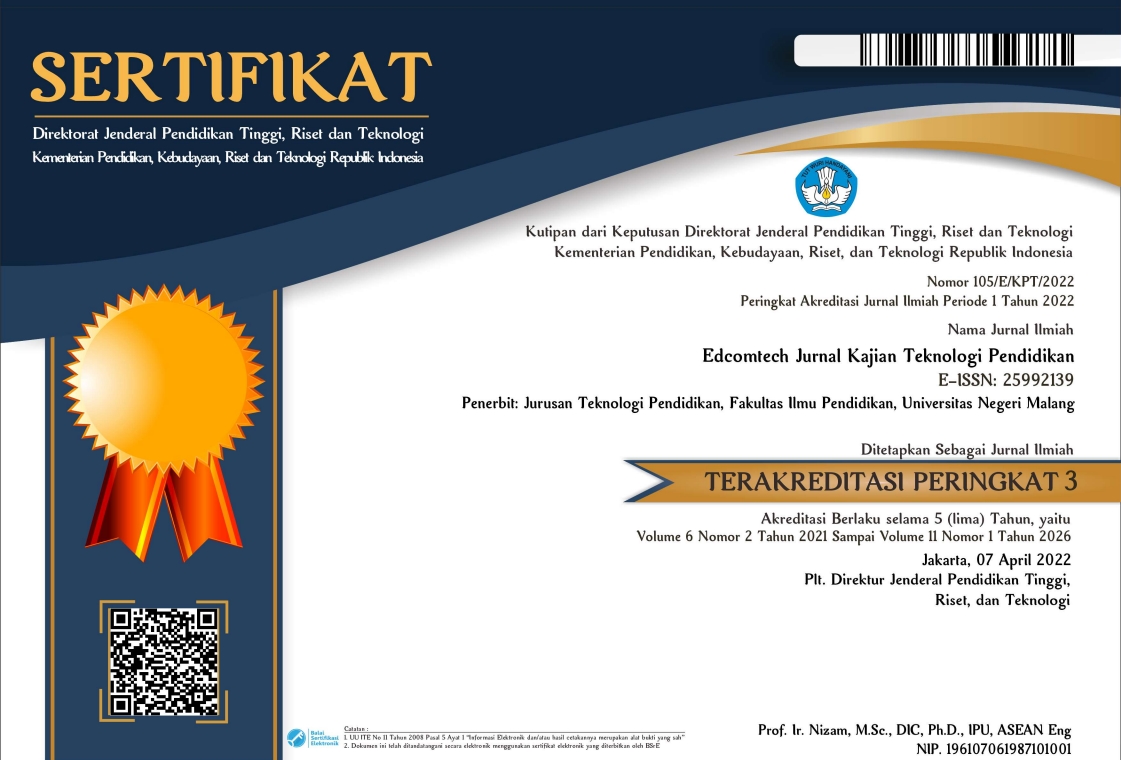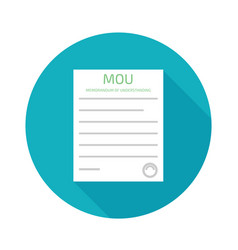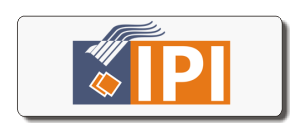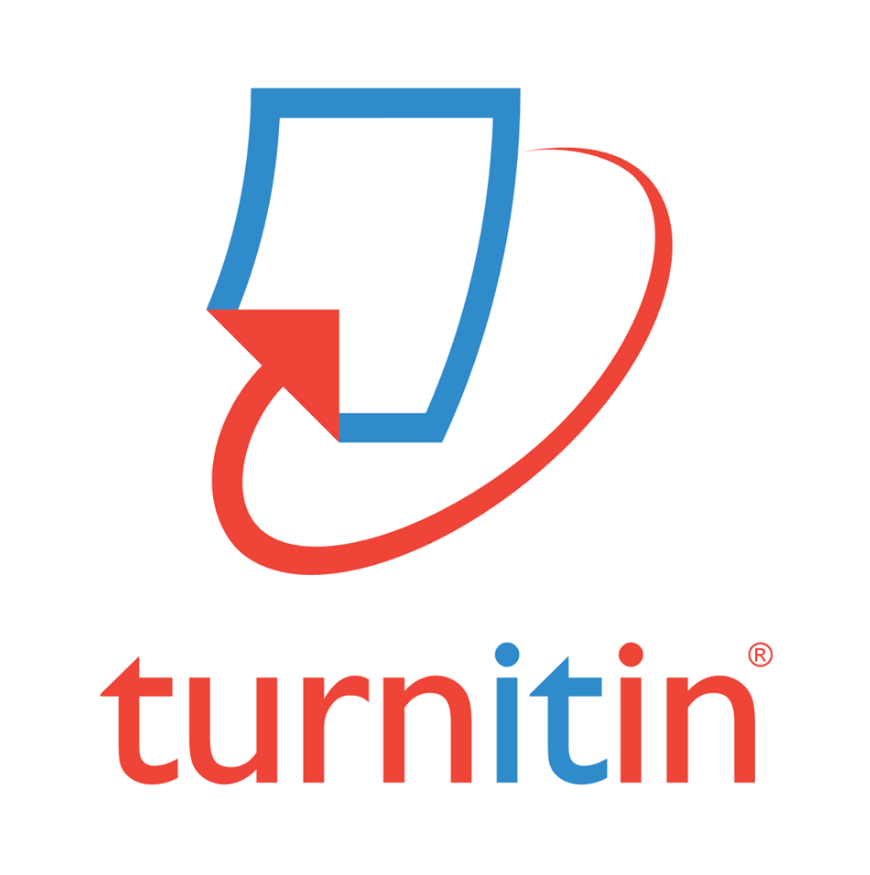Development of Educational Board Games to Increase Knowledge of Environmental Care Integrated with QR Codes and Applications
Abstract
Keywords
References
Arikunto, S. (2010). Prosedur penelitian suatu pendekatan praktek. (No Title).
Ismail, B., Ali, T., Ramadhani, M., Asshowabi, M. Z., & Adima, R. (2023). EcoFun Sebagai Media Pembelajaran Anak Sekolah Dasar Agar Lebih Peduli Lingkungan. Prosiding Seminar Nasional Kemahasiswaan, 1(1), 52–56.
ARYANI, B. D. (2014). Mengembangkan Sikap Peduli Lingkungan Melalui Bermain Ecofunopoly. Didaktika Dwija Indria, 2(10).
Aulia, E. R., Maulidiyah, E. C., Fitric, R., & Mas’udah, M. (2022). Media Ular Tangga Qr Code Terhadap Kemampuan Berpikir Logis Pada Anak Usia 5-6 Tahun. Kumarottama: Jurnal Pendidikan Anak Usia Dini, 2(1), 73–92. https://doi.org/10.53977/kumarottama.v2i1.599
Backfisch, I., Sibley, L., Lachner, A., Kirchner, K. T., Hische, C., & Scheiter, K. (2024). Enhancing pre-service teachers’ technological pedagogical content knowledge (TPACK): Utility-value interventions support knowledge integration. Teaching and Teacher Education, 142. https://doi.org/10.1016/j.tate.2024.104532
Branch, R. M., & Branch, R. M. (2009). Develop. Instructional Design: The ADDIE Approach, 82–131.
Bilancini, E., Boncinelli, L., & di Paolo, R. (2023). Game-based education promotes practices supporting sustainable water use. Ecological Economics, 208. https://doi.org/10.1016/j.ecolecon.2023.107801
Desi, N., Sabri, M., Karim, A., Gonibala, R., Suardi Wekke, I., Alauddin Makassar, N., Tinggi Ilmu Ekonomi Amkop Makassar, S., & Selatan, S. (2021). Environmental Conservation Education: Theory, Model, and Practice (Issue 3).
Efendi, N., Surya Barkara, R., & Fitria, Y. (2020). Implementasi Karakter Peduli Lingkungan di Sekolah Dasar Lolong Belanti Padang. Jurnal Komunikasi Pendidikan, 4(2). www.journal.univetbantara.ac.id/index.php/komdik
Jaelani, W. R., Vichaully, Y., Rustini, T., Wahyuningsih, Y., & Sekolah, P. G. (2023). Pengembangan Media Pembelajaran Berbasis Game Pilah Sampah dalam Meningkatkan Rasa Peduli Lingkungan Siswa pada Materi Kenampakan Alam di Kelas IV SD. Journal on Education, 05(02), 3388–3393.
Jordi, D. (1205). Perancangan Board Game Edukatif Tentang Peduli Lingkungan Untuk Anak Usia 7-12 Tahun Jurnal Prodi Desain Komunikasi Visual Jurusan Seni Rupa Fakultas Bahasa Dan Seni Universitas Negeri Padang Wisuda Periode.
Masykuroh, K., & Wahyuni, T. (2023). Media Pop-Up Book Untuk Meningkatkan Karakter Peduli Lingkungan Pada Anak Usia Dini. Aulad: Journal on Early Childhood, 6(2), 172–181. https://doi.org/10.31004/aulad.v6i2.483
Maulidina, A. F., Wandi, W., & Rachman, M. Z. (2024). Pengaruh edukasi kesehatan menggunakan board game terhadap pengetahuan dan sikap pemilahan sampah. Journal of Health Research Science, 4(02), 232–239.
Maurer, M., & Bogner, F. X. (2020). Modelling environmental literacy with environmental knowledge, values and (reported) behaviour. Studies in Educational Evaluation, 65, 100863. https://doi.org/https://doi.org/10.1016/j.stueduc.2020.100863
Mawan Akhir Riwanto, & Nuning Budiarti, W. (2021). Pengembangan Media Pembelajaran Interaktif IPA SD Terintegrasi Pendidikan Karakter Peduli Lingkungan. Jurnal Pendidikan Dasar Nusantara, 6(2), 71–82. https://doi.org/10.29407/jpdn.v6i2.14974
Munasti, K., & Pendidikan Guru Anak Usia Dini, J. (2020). Pengembangan Bag Book Sebagai Media Pembelajaran Pendidikan Karakter Peduli Lingkungan Pada Anak Usia 5-6 Tahun. In Jurnal Ilmiah Mahasiswa Pendidikan Guru Anak Usia Dini (Vol. 5, Issue 2).
Nabila, S. U., Lestari, G. D., & Yulianingsih, W. (2023). Pembiasaan Nilai-Nilai Kepedulian Lingkungan pada Anak Usia Dini melalui Prinsip Pembelajaran. Jurnal Obsesi : Jurnal Pendidikan Anak Usia Dini, 7(1), 1105–1118. https://doi.org/10.31004/obsesi.v7i1.3859
Naziyah, S., Akhwani, A., Nafiah, N., & Hartatik, S. (2021). Implementasi Pendidikan Karakter Peduli Lingkungan di Sekolah Dasar. Jurnal Basicedu, 5(5), 3482–3489. https://doi.org/10.31004/basicedu.v5i5.1344
Novianti, R., Islam, I. A., Lampung, A. N., & Artikel, I. (2021). Model Pembelajaran Untuk Menumbuhkan Karakter Peduli Lingkungan Mata Pelajaran IPA. 2(2), 16–23.
Pane, M. M., & Patriana, R. (2016). The Significance of Environmental Contents in Character Education for Quality of Life. Procedia - Social and Behavioral Sciences, 222, 244–252. https://doi.org/10.1016/j.sbspro.2016.05.153
Prasetya, D. D., Sakti, W., & Patmanthara, S. (2013). Digital game-based learning untuk anak usia dini. Tekno, 20(2), 45–50.
Raab, P., & Bogner, F. X. (2021). Knowledge acquisition and environmental values in a microplastic learning module: Does the learning environment matter? Studies in Educational Evaluation, 71, 101091. https://doi.org/https://doi.org/10.1016/j.stueduc.2021.101091
Rizal, S., Meidawaty, S., Palapa, S., Lombok, N., Ciamis, I., & Barat, J. (2020). MEMBANGUN KEPEDULIAN LINGKUNGAN PESERTA DIDIK MI MELALUI LITERASI SAINS. In Jurnal Pendidikan dan Dakwah (Vol. 2). https://ejournal.stitpn.ac.id/index.php/pandawa
Safitri, W. C. D. (2020). Pengembangan media board game untuk pembelajaran tematik di sekolah dasar. JINoP (Jurnal Inovasi Pembelajaran), 6(2). https://doi.org/10.22219/jinop.v6i2.8186
Saifuddin. (2014). Pengelolaan Pembelajaran Teoritis dan Praktis. Deepublish.
Siskayanti, J., & Chastanti, I. (2022). Analisis Karakter Peduli Lingkungan pada Siswa Sekolah Dasar. Jurnal Basicedu, 6(2), 1508–1516. https://doi.org/10.31004/basicedu.v6i2.2151
Slamet, F. A. (2022). Model Penelitian Pengembangan (R n D). Malang: Institut Agama Islam Sunan Kalojogo Malang.
Stöckert, A., & Bogner, F. X. (2021). Learning about waste management: The role of science motivation, preferences in technology and environmental values. Sustainable Futures, 3, 100054. https://doi.org/https://doi.org/10.1016/j.sftr.2021.100054
Sugiyono. (2019). Metode Penelitian & Pengembangan. Alfabeta.
Vu, P., & Feinstein, S. (2017). An exploratory multiple case study about using game-based learning in STEM classrooms. International Journal of Research in Education and Science, 3(2), 582–588.
Wahyudin, U. (2017). Strategi Komunikasi Lingkungan Dalam Membangun Kepedulian Masyarakat Terhadap Lingkungan. In Jurnal Common | (Vol. 1).
Zikrillah, A., H(Slamet, 2022)umardhiana, A., Syekh, I., Cirebon, N., Perjuangan, J., Sunyaragi, P., & Cirebon, K. (2021). Perancangan Media Pembelajaran Board Game Edumaze Untuk Jenjang Pendidikan Sekolah Dasar. Jurnal Pendidikan Seni, 4(2).
Refbacks
- There are currently no refbacks.
Copyright (c) 2024 Nadine Margaretha Octaviola, Khusnul Khotimah

This work is licensed under a Creative Commons Attribution-ShareAlike 4.0 International License.
Edcomtech: Jurnal Kajian Teknologi Pendidikan published by Department of Educational Technology, Faculty of Education, State University of Malang in Collaboration with Asosiasi Program Studi Teknologi Pendidikan Indonesia (APS TPI) and Ikatan Profesi Teknologi Pendidikan Indonesia (IPTPI) with MoU.
Publisher Address:
Lab. Teknologi Pendidikan, Gd.E2, Lt.1
Fakultas Ilmu Pendidikan Universitas Negeri Malang
Jalan Semarang No 5, Kota Malang Kode Pos 65145
Email: edcomtech.fip@um.ac.id
========================================================================================================
| INDEXED BY | TOOLS | PLAGIARISM CHECK | ARTICLE TEMPLATE |
|

Edcomtech is licensed under a Creative Commons Attribution-ShareAlike 4.0 International License.
Edcomtech Statistics (Since July 13th, 2020)











1.png)








